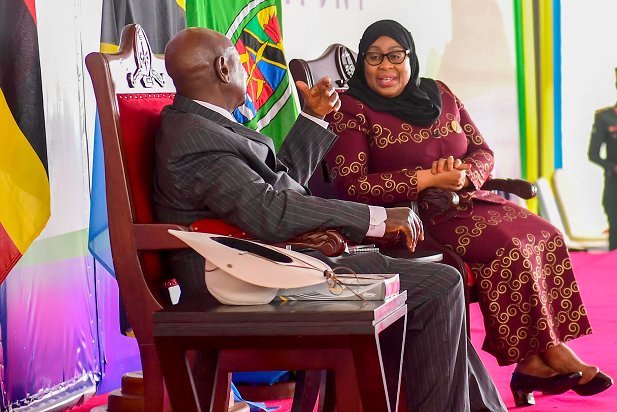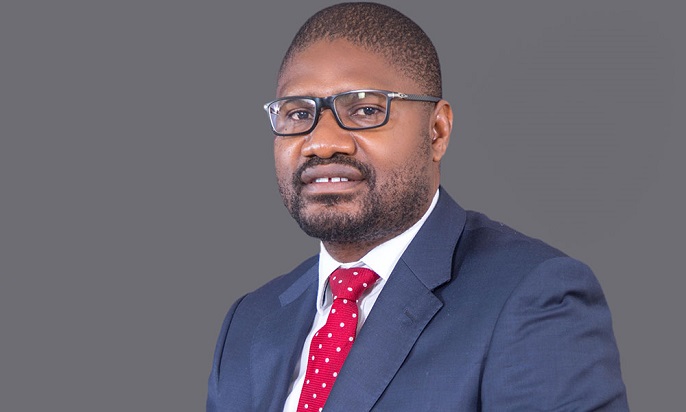President Museveni addresses the Tanzania-Uganda Oil and Gas Symposium, Sunday as Host President Suluhu Hassan Looks on
The private sector, specifically those in businesses relating to the oil and gas industry want the governments of Uganda and Tanzania to lift some of their national laws that might hinder companies from taking advantages, especially across the border.
This is mainly in regard to projects that companies in Uganda may want to undertake in Tanzania and vice-versa for the Tanzanian investors.
Currently, while the two countries have tried to introduce some harmonized policies regarding the industry, the private sector say there are still some areas where it is difficult for them to cross borders.
Patrick Mweheire, the Chairman of the Uganda Chamber of Mines and Petroleum gives the example of Tanzania’s view of local companies, where for one to be considered so, there must be a 25 percent local ownership.
In Uganda, the Local Content Policy provides for companies started and registered in the names of Ugandans, and some products and services in the oil and gas industry have been ring-fenced for them.
The other services are free to be competed for by any person.
Speaking at the Tanzania-Uganda Oil and Gas Symposium in Dar es Salaam, Mweheire asked that such barriers should be lifted for at least three years to help the private businesses in the two countries to take advantage of the available opportunities.
This came after Uganda’s Minister for Energy and Mineral Development, Ruth Nankabirwa stressed that investors from either of the two countries will be treated as local companies, a stand repeated by her Tanzanian counterparts.
She, however, asked the investors from the two countries to form cross-border joint ventures which will help share experiences and in mobilizing resources.
She revealed that the East African Crude Oil Pipeline (EACOP) Bill is due for conclusion in parliament on Tuesday and this will pave the way for several activities including starting construction.
The EACOP is among the last steps towards the development of oil and gas, and the Bill is aimed at domesticating the already signed agreements by the two countries before the company commences construction.
“The law will kickstart the commercialization of Uganda’s oil and gas resources and facilitate the upstream partners to take the long-awaited Final Investment Decision and the development of the Petroleum sector,” the Attorney General Kiryowa Kiwanuka said recently.
Mweheire, who is also the Regional Chief Executive of Stanbic Bank East Africa asked the governments to step up efforts aimed at empowering the local companies to take up opportunities that may otherwise be grabbed by foreign investors.
In response, President Yoweri Museveni reasoned that the financial sector should focus on economically empowering the local citizens so that when opportunities come up, they do not have to look for emergency solutions.
He says for example, if Ugandans had better incomes, at the start of the oil and gas sector, it would be easy for them to be involved.
On the global campaign against financing the oil and gas products, President Museveni said the industry should not be afraid of the future importance of the commodity.
The developed world is leading the transition to electric vehicles and some cities have given deadlines of between five and 10 years to have eradicated petroleum-powered vehicles off their streets.
This is causing discomfort to the younger and prospective petroleum-producing countries like Uganda about the value of oil.
However, President Museveni says even if the use of petroleum to power vehicles ends in a few years, the commodity will still be required for many uses including in the motor industry.
He gave the example of synthetic vehicle tyres, car seats and another furnishing, clothing, bitumen for road construction among others, adding that it is how oil is applied which is the issue, but not the production of the resource.
Museveni says empowering people economically solves many problems including the issue of the market. Referring to the trade wars between the East African countries, the President said for example, Ugandans are poor consumers of milk and the country finds itself with excess supply.
He also attacked his ministers especially in Finance, Planning and Economic Development for failing to help the sugar industry to diversify to products like industrial sugar instead of quarreling with neighbouring countries over the market.
-URN






There is need for oil exportation to earn foreign exchange.